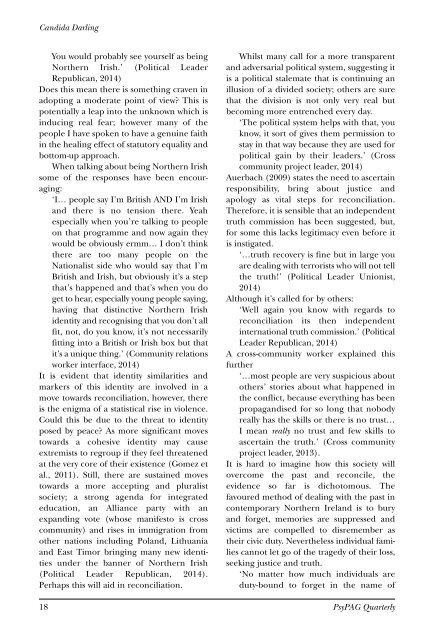Social Psychology Special Issue
PsyPAG-Quarterly-Issue-973
PsyPAG-Quarterly-Issue-973
You also want an ePaper? Increase the reach of your titles
YUMPU automatically turns print PDFs into web optimized ePapers that Google loves.
Candida Darling<br />
You would probably see yourself as being<br />
Northern Irish.’ (Political Leader<br />
Republican, 2014)<br />
Does this mean there is something craven in<br />
adopting a moderate point of view? This is<br />
potentially a leap into the unknown which is<br />
inducing real fear; however many of the<br />
people I have spoken to have a genuine faith<br />
in the healing effect of statutory equality and<br />
bottom-up approach.<br />
When talking about being Northern Irish<br />
some of the responses have been encouraging:<br />
‘I… people say I’m British AND I’m Irish<br />
and there is no tension there. Yeah<br />
especially when you’re talking to people<br />
on that programme and now again they<br />
would be obviously ermm… I don’t think<br />
there are too many people on the<br />
Nationalist side who would say that I’m<br />
British and Irish, but obviously it’s a step<br />
that’s happened and that’s when you do<br />
get to hear, especially young people saying,<br />
having that distinctive Northern Irish<br />
identity and recognising that you don’t all<br />
fit, not, do you know, it’s not necessarily<br />
fitting into a British or Irish box but that<br />
it’s a unique thing.’ (Community relations<br />
worker interface, 2014)<br />
It is evident that identity similarities and<br />
markers of this identity are involved in a<br />
move towards reconciliation, however, there<br />
is the enigma of a statistical rise in violence.<br />
Could this be due to the threat to identity<br />
posed by peace? As more significant moves<br />
towards a cohesive identity may cause<br />
extremists to regroup if they feel threatened<br />
at the very core of their existence (Gomez et<br />
al., 2011). Still, there are sustained moves<br />
towards a more accepting and pluralist<br />
society; a strong agenda for integrated<br />
education, an Alliance party with an<br />
expanding vote (whose manifesto is cross<br />
community) and rises in immigration from<br />
other nations including Poland, Lithuania<br />
and East Timor bringing many new identities<br />
under the banner of Northern Irish<br />
(Political Leader Republican, 2014).<br />
Perhaps this will aid in reconciliation.<br />
Whilst many call for a more transparent<br />
and adversarial political system, suggesting it<br />
is a political stalemate that is continuing an<br />
illusion of a divided society; others are sure<br />
that the division is not only very real but<br />
becoming more entrenched every day.<br />
‘The political system helps with that, you<br />
know, it sort of gives them permission to<br />
stay in that way because they are used for<br />
political gain by their leaders.’ (Cross<br />
community project leader, 2014)<br />
Auerbach (2009) states the need to ascertain<br />
responsibility, bring about justice and<br />
apology as vital steps for reconciliation.<br />
Therefore, it is sensible that an independent<br />
truth commission has been suggested, but,<br />
for some this lacks legitimacy even before it<br />
is instigated.<br />
‘…truth recovery is fine but in large you<br />
are dealing with terrorists who will not tell<br />
the truth!’ (Political Leader Unionist,<br />
2014)<br />
Although it’s called for by others:<br />
‘Well again you know with regards to<br />
reconciliation its then independent<br />
international truth commission.’ (Political<br />
Leader Republican, 2014)<br />
A cross-community worker explained this<br />
further<br />
‘…most people are very suspicious about<br />
others’ stories about what happened in<br />
the conflict, because everything has been<br />
propagandised for so long that nobody<br />
really has the skills or there is no trust…<br />
I mean really no trust and few skills to<br />
ascertain the truth.’ (Cross community<br />
project leader, 2013).<br />
It is hard to imagine how this society will<br />
overcome the past and reconcile, the<br />
evidence so far is dichotomous. The<br />
favoured method of dealing with the past in<br />
contemporary Northern Ireland is to bury<br />
and forget, memories are suppressed and<br />
victims are compelled to disremember as<br />
their civic duty. Nevertheless individual families<br />
cannot let go of the tragedy of their loss,<br />
seeking justice and truth.<br />
‘No matter how much individuals are<br />
duty-bound to forget in the name of<br />
18 PsyPAG Quarterly


